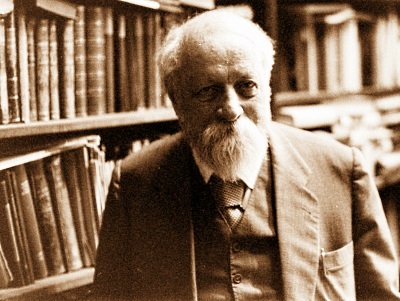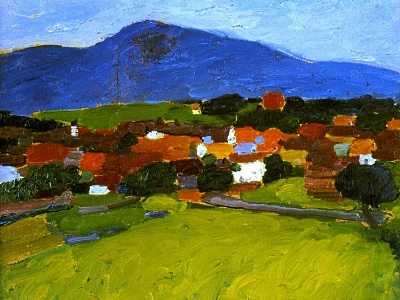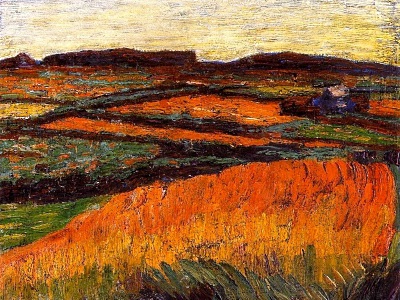In 1919 Pastor Otto Herpel – Eberhard Arnold’s publishing partner – invited about five hundred religious socialist pastors, ministers, and socially active Christians from Germany and Switzerland to a September conference on the theme of “The Christian in Church, State, and Society.” About one hundred actually took part, sixty of them theologians. In a late addition to the program, the keynote address was delivered by the Swiss pastor Karl Barth. Eberhard Arnold was Barth’s co-lecturer.
Barth, who was then basically unknown in Germany, had certain preconceived notions for the conference. Even beforehand he had written to a friend, “What is to be done in this atmosphere where one can still hear undertones of ‘with God for emperor and fatherland’ echoing through the cheers for religious socialism? How can any kind of hearing be won for a reminder of the totaliter aliter of the kingdom of heaven?” Totaliter aliter – totally other – was the attractive common denominator of Barth’s theology.
Barth’s theme was “The Christian in Society.” He began by asserting that the traditional, church-oriented religion “is the only religion conceivable and possible within society.” He declared that Søren Kierkegaard and Leo Tolstoy were lovable utopians and dreamers – nothing more. So were Fyodor Dostoyevsky, Hermann Kutter, the Christian mystics, the Anabaptists, and a formidable list of others. “Thus,” Barth asserted, “we must now safeguard ourselves from the error of trying to satisfy the conditions of the kingdom of God by criticizing, protesting, reforming, organizing, or by introducing democracy, socialism, or revolution.” In a nutshell: human beings are insignificant. God spans the entire horizon, end to end, top to bottom. Human beings can do nothing. God must do everything.
Barth summed up his pronouncement in his closing words: “What should we do, then? . . . There is but one thing we can do. And even that one thing is not really done by us. For what can a Christian do in society other than pay attention to what God is doing?”
Barth’s talk provoked such a strong reaction that it nearly blotted out awareness of anything else at the conference. At times scholars have even disputed whether Eberhard ever gave the scheduled second lecture on the same theme. But contemporary documents show that he did.
Eberhard took the affair calmly. It is possible that he alone among the German representatives at the conference had known about Barth’s ideas beforehand. He had written a letter to Barth explaining that he, Eberhard, was to lecture on the same theme, and he had asked Barth to send him the main ideas of his speech in advance. Eberhard immediately acknowledged Barth’s outstanding theological intellect, and he would later make repeated efforts to get him to provide articles and other material for publication. Barth could not deflect Eberhard – not from his literal interpretation of the Sermon on the Mount and still less from his inner relationship to God, which, according to Barth – totaliter aliter – had no right to exist. It is enlightening to read the notes Eberhard jotted in his copy of Max Strauch’s book on the theology of Karl Barth. Eberhard contested the idea that the relationship between God and individual people – between Creator and created being – is “only indirect, with no possible communication.” He stressed exactly the opposite: “That relationship does exist.”
However, Eberhard had his own inner affinity with Barth, which is the reason he persisted so urgently in his efforts to gain Barth’s involvement with the Neuwerk Publishing House. In 1920, as Eberhard and Otto Herpel selected themes to be emphasized in publication, they included the witness of Johann Christoph and Christoph Friedrich Blumhardt. Eberhard easily recognized that Karl Barth had borrowed certain ideas from Johann Christoph Blumhardt and had included them in his monumental commentary on the apostle Paul’s letter to the Romans.
Later on, as the Rhön Bruderhof was beginning to be put under pressure by the new National Socialist government, Eberhard sought to re-establish contact with Karl Barth, whose text on the “freedom of the gospel”[1] had, according to one later account, “been quite an encouragement to us during this period.”[2] Eberhard sent Hans Meier as the community’s representative to meet him in 1934 and give him some Bruderhof literature, including Eberhard’s Light and Fire and a pamphlet on the Holy Spirit.
Though their theology diverged in many ways, in the great test of their allegiance when faced with Nazi persecution, both Barth and Eberhard held true to their faith in God and his kingdom.
Adapted from Markus Baum, Against the Wind: Eberhard Arnold and the Bruderhof (Walden, NY: Plough, 2015) and an unpublished translation of Thomas Nauerth, Zeugnis, Liebe und Widerstand: Der Rhönbruderhof 1933-1937 (Paderborn: Ferdinand Schoeningh, 2017).
1. Karl Barth, Für die Freiheit des Evangeliums, Theologische Existenz heute 2 (Munich: Chr. Kaiser Verlag, 1933).
2. Hans Zumpe, “Unsere Auseinandersetzung,” 32f. This account is especially notable to the extent that the community was fully aware of their theological differences with Barth: “Sören Kierkegaard, like his successor Karl Barth, in principle excludes economic considerations from Christian thought. We do not share this view.” Eberhard Arnold, meeting transcript, December 29, 1932.


